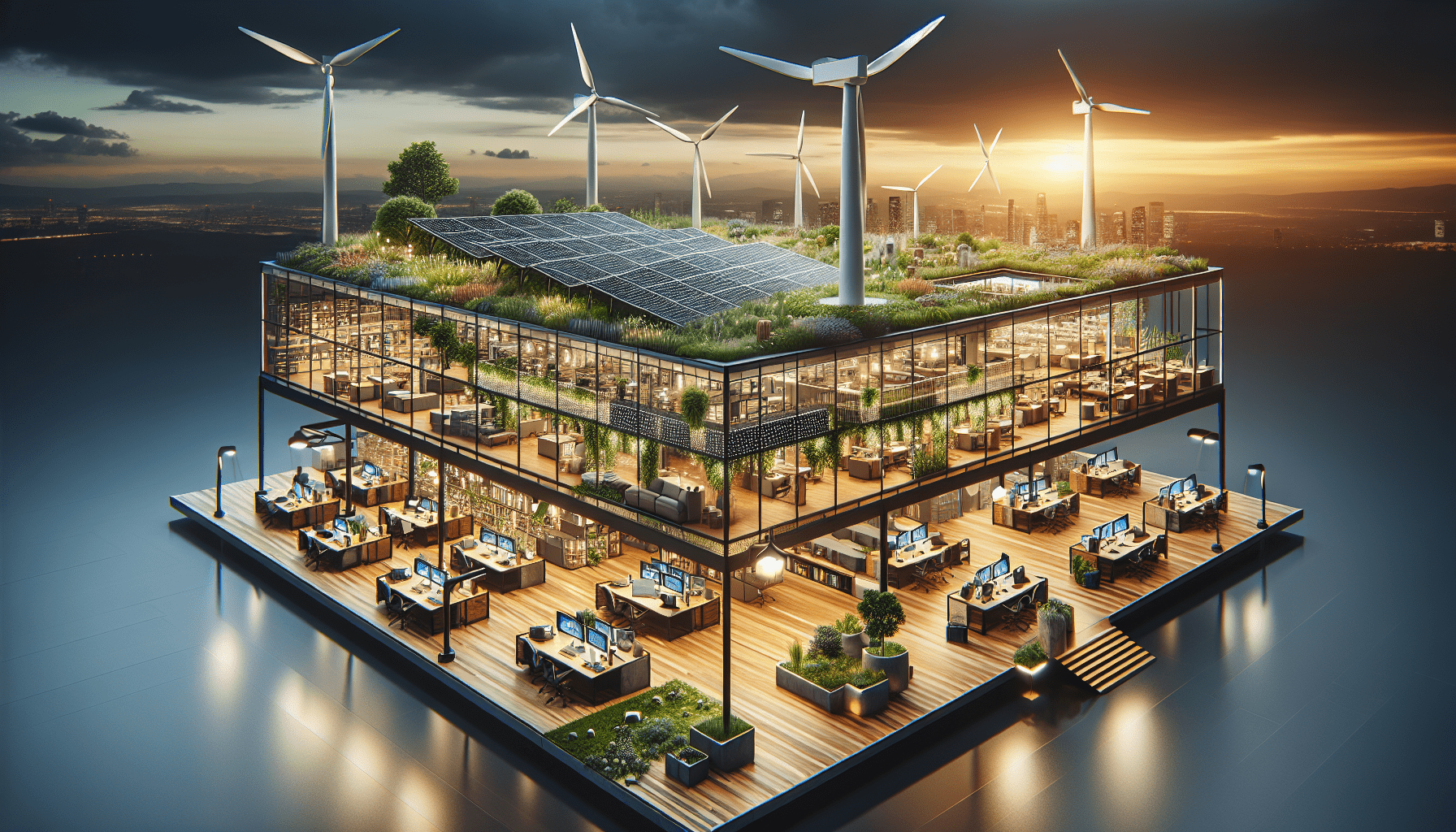In today’s rapidly evolving world, the intersection of technology and sustainability is more important than ever. Our article, “How Can Businesses Benefit From Sustainable Technology?” explores the numerous advantages that eco-friendly innovations bring to the corporate landscape. As we delve into this exciting topic, we’ll uncover how adopting sustainable technologies not only helps the environment but also boosts efficiency, enhances brand reputation, and leads to significant cost savings. Join us as we discover the transformative power of going green in business. How can businesses benefit from sustainable technology?
We’ve all been hearing a lot about sustainable technology lately, but how can businesses actually benefit from it? Here, we take a deep dive into how sustainable technology can transform businesses and bring numerous advantages. Our aim is to break it down comprehensively, so we can all understand and appreciate the potential benefits.
What is Sustainable Technology?
Sustainable technology refers to innovations that consider the environmental, economic, and social impacts of their development and use. These technologies are designed to meet current needs without compromising the ability of future generations to meet theirs. Let’s delve into what makes technology ‘sustainable.’
Environmental Impact
These technologies minimize adverse effects on the environment. This can include reducing greenhouse gas emissions, using renewable resources, and generating less waste.
Economic Viability
Sustainable technology must be economically viable. This means that it should offer cost advantages either through savings or new business opportunities, ensuring long-term operational efficiency.
Social Benefits
Social benefits are equally important. Sustainable technologies should improve quality of life, promote equity, and support social structures. When we talk about social sustainability, we refer to benefits like health improvements and job creation.
The Business Case for Sustainable Technology
Integrating sustainable technology into our business operations is no longer just an ethical choice; it’s a strategic decision that can yield multiple benefits. Let’s see how.
Cost Savings
Initially, sustainable technology might require an investment. However, in the long run, it can lead to significant cost savings. Energy-efficient systems, for instance, can drastically cut down utility bills.
Examples of Cost Savings:
| Sustainable Technology | Potential Savings |
|---|---|
| LED Lighting Systems | Up to 75% energy reduction compared to traditional lighting |
| Solar Energy Systems | Reduction or complete removal of electricity bills |
| Water Recycling Systems | Reduced water bills and less dependency on external water sources |
Enhancing Brand Image
Consumers today are increasingly environmentally conscious. By adopting sustainable technology, businesses can enhance their brand image and align themselves with the values of their target audience.
Competitive Advantage
Sustainable technology can also provide a competitive edge. It can foster innovation and lead to the development of unique products or services, differentiating a business from its competitors.
Regulatory Compliance
Governments around the world are implementing stricter environmental regulations. By adopting sustainable technology, businesses can ensure they remain compliant and avoid fines or penalties.
Risk Management
Sustainable practices contribute to better risk management. They make operations more resilient against disruptions like resource shortages or regulatory changes.

Types of Sustainable Technology for Businesses
There are various types of sustainable technologies that businesses can adopt. Below, we highlight some of the most impactful ones.
Renewable Energy
Embracing renewable energy sources like solar, wind, and geothermal helps reduce carbon footprints and dependence on fossil fuels. Companies can either harness these energies directly or purchase renewable energy credits.
Solar Energy
Solar panels can be installed on rooftops or other spaces to generate electricity. This can significantly reduce energy costs and reliance on non-renewable energy sources.
Wind Energy
Wind turbines can be used to generate electricity in areas with sufficient wind speeds. This can be particularly beneficial for large businesses with substantial energy needs.
Energy Efficiency Technologies
These technologies aim to make better use of energy. Examples include smart grids, energy-efficient HVAC systems, and automated lighting systems.
Smart Grids
Smart grids monitor and manage energy use dynamically, ensuring efficient distribution and reducing wastage.
Energy-Efficient HVAC Systems
Modern HVAC systems use advanced sensors and controls to optimize heating, ventilation, and air conditioning, ensuring minimal energy consumption.
Waste Management Technologies
Effective waste management reduces the environmental impact and can also turn waste into a resource. Technologies like waste-to-energy systems and advanced recycling techniques are paving the way.
Waste-to-Energy Systems
These systems convert waste materials into useful energy, reducing landfill use and generating electricity or heat.
Advanced Recycling Techniques
Innovations in recycling techniques allow for the processing of more types of materials, leading to less waste and more resource recovery.
Water Conservation Technologies
As water scarcity becomes a pressing issue, businesses are looking for ways to reduce their water consumption. Technologies like rainwater harvesting and greywater recycling are leading the charge.
Rainwater Harvesting
Systems that collect and store rainwater can be used for irrigation, flushing toilets, and other non-potable uses, reducing freshwater demand.
Greywater Recycling
Recycling greywater (water from sinks, showers, etc.) for non-potable uses can significantly reduce the total water consumption of a facility.
Sustainable Supply Chain Technology
From sourcing to production to delivery, sustainable technology can optimize supply chains to be more environmentally and socially responsible.
Blockchain for Transparency
Blockchain technology can ensure transparency and traceability in supply chains, ensuring materials are ethically sourced and reducing waste.
IoT for Monitoring
Internet of Things (IoT) devices can monitor goods’ conditions throughout the supply chain, helping prevent spoilage and waste.
Implementing Sustainable Technology: Steps and Strategies
The path to integrating sustainable technology into our business operations can be challenging but rewarding. Here’s a roadmap to guide our journey.
Assessment and Planning
Before diving in, we need to assess our current operations and identify areas where sustainable tech can make the most impact. This involves a thorough audit of energy consumption, waste generation, water use, and supply chain practices.
Setting Goals
Once we have a clear understanding of our current situation, setting achievable and measurable goals is crucial. These goals should be aligned with our overall business strategy and sustainability objectives.
Securing Buy-In
Implementing new technologies requires support from all stakeholders. Communicating the benefits and addressing concerns can help secure the necessary buy-in from employees, management, and shareholders.
Pilot Projects
Starting with pilot projects can help us understand the practical challenges and potential benefits. These projects can serve as proof of concept, paving the way for larger-scale implementations.
Full-Scale Implementation
Once pilot projects prove successful, we can move towards full-scale implementation. This involves upgrading or replacing existing systems, training staff, and integrating new practices into everyday operations.
Monitoring and Optimization
After implementation, continuous monitoring is essential. This helps ensure the new technologies are performing as expected and provides data to optimize and improve them further.

Overcoming Challenges in Adopting Sustainable Technology
While the benefits of sustainable technology are clear, the path to adoption is often riddled with challenges. Awareness of these obstacles can help us navigate them more effectively.
Initial Costs
The upfront costs of sustainable technology can be a significant barrier. However, these can be mitigated through government grants, subsidies, and financing options specifically for sustainability projects.
Technical Expertise
Not all businesses have the technical know-how to implement advanced technologies. Collaborating with experts and leveraging partnerships can bridge this gap.
Resistance to Change
Employees and stakeholders may resist change. Clear communication, education, and involvement in the process can ease this resistance.
Measuring Impact
Quantifying the impact of sustainable technology can be challenging. Developing robust metrics and using data analytics can help track and demonstrate the effectiveness of these investments.
Case Studies: Businesses Benefiting from Sustainable Technology
Nothing illustrates the advantages of sustainable technology better than real-life examples. Let’s look at some businesses that have successfully integrated sustainable tech into their operations.
Google has been a frontrunner in using renewable energy. The tech giant has committed to purchasing enough renewable energy to match its global consumption. This move not only bolsters its environmental credentials but also ensures long-term energy price stability.
Patagonia
Patagonia, the outdoor apparel company, integrates sustainability into every aspect of its operations. From using recycled materials to promoting fair labor practices, Patagonia demonstrates that sustainability and profitability can go hand in hand.
Walmart
Walmart has made substantial investments in energy efficiency and renewable energy. Their initiatives include installing solar panels on store rooftops and retrofitting stores with LED lighting. These efforts have resulted in significant cost savings and reduced environmental impact.
Unilever
Unilever’s Sustainable Living Plan aims to decouple its growth from environmental impact. The company employs various sustainable technologies in its manufacturing processes and has seen impressive results, from cost reductions to increased employee engagement.

The Future of Sustainable Technology
Sustainable technology is continually evolving, and its future is filled with possibilities. Emerging innovations promise to make businesses even more efficient, resilient, and forward-thinking. Let’s explore some trends that could shape the future.
Circular Economy Solutions
The circular economy, where resources are reused and recycled continuously, is gaining traction. Technologies enabling efficient recycling, product lifecycle tracking, and waste-to-resource conversion will be pivotal.
Artificial Intelligence and Machine Learning
AI and machine learning can optimize resource use in ways previously unimaginable. From predictive maintenance to smart logistics, these technologies can enhance sustainability across operations.
Carbon Capture and Storage
Carbon capture technology can trap and store CO2 emissions, preventing them from entering the atmosphere. As the technology matures, it could become a critical tool in combating climate change.
Energy Storage Innovations
Advancements in energy storage, such as improved battery technologies, will make renewable energy more viable. Better storage solutions can ensure a consistent energy supply, even when renewable sources are intermittent.
Conclusion
Sustainable technology offers a myriad of benefits for businesses willing to embrace it. From cost savings and regulatory compliance to enhanced brand image and risk management, the advantages are substantial. While the path to adoption may have its challenges, the long-term gains make it a worthwhile investment. The future of business is green, and sustainable technology is paving the way. By understanding, adopting, and optimizing these innovations, we can ensure not just our success but also that of the planet.
We hope this deep dive into sustainable technology has provided valuable insights and encourages your business to take the next step towards a sustainable future. Let’s embrace this journey together.




